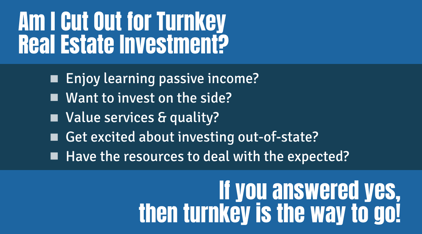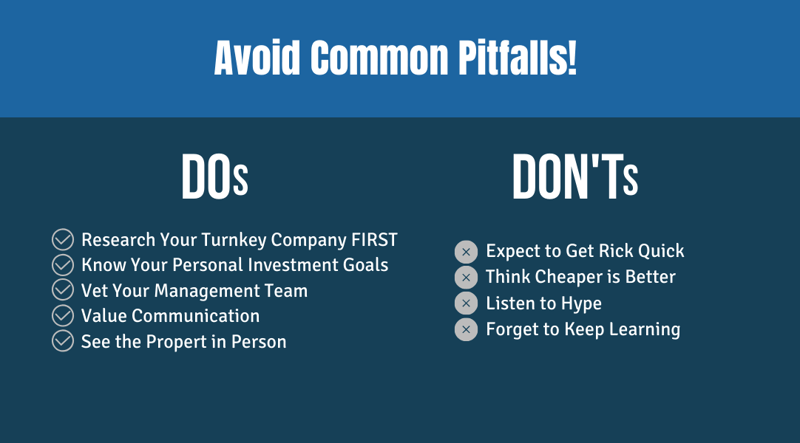Every week, more and more first time investors head onto the road to learning about their options and getting started in real estate. There is a lot to learn. What is even better is the fact that there are millions of experienced investors in both real estate and other markets that are making moves daily to get into the real estate investing game. That’s great! But hey—there are a ton of options out there in real estate. It’s not enough to decide that you want to be a real estate investor. You have to think about what kind of investor you really want to be.
You can go the fix and flip route for a hands on approach, you can assume the role of landlord for a handful of properties or apartment units, you can dig deep into commercial real estate, or look to land and development...There are plenty of ways to invest.

One way, however, offers opportunities to earn passive income in the most passive way possible. Is there still work involved? Absolutely. All investments require, well, investment. But if you’re in the market for a more hands-off approach to investing, turnkey real estate just might be right for you. So much of deciding what kind of investments to pursue just depends on what you as an individual enjoy and value.
To help you decide, we’re diving deep and looking at the the ins and outs of turnkey real estate: what it is, how it works, what you have to gain, and what red flags you should watch for to ensure the best outcome for your financial future.
What Exactly Is Turnkey Real Estate?
At the most basic level, turnkey real estate typically refers to investment properties that are already rehabbed, tenant-occupied, have management in place, and are producing positive cash flow. The term comes from the idea that you can “turn the key” in the door and walk right on in.
With a traditional residential rental property, the investor would purchase it, fund renovations, find a tenant, hire a property management company, and then hopefully see profit. Turnkey real estate cuts out a lot of steps, making the on ramp to positive cash flow shorter.
But there’s a catch…
One problem in turnkey real estate that we’ve mentioned before is that there’s simply no set meaning for the term “turnkey real estate.” We say “typically” because turnkey real estate companies can look very, very different (and we’ll dive into those differences and red flags later).
Make no mistake: we think turnkey real estate investments are great. But they also have to be the right investments with the right people. Remember: no investment is a sure thing. They all require careful research, attention to detail, and putting value in the right places.
Still, a strong case can be made for the benefits of turnkey real estate. When you know what pitfalls to watch out for, you can rest easy equipped with the knowledge to find success as a turnkey real estate investor.
Why Turnkey? Let’s Do a Rundown of the Benefits.
Ideal for Out-of-State Investors
Not everyone has the want or need to invest in their own local real estate markets. Your local market might not have the price point you need or offer exactly what you’re looking for. Maybe you want to get in on “hot” markets that are showing promise. Out-of-state investing, however, can be pretty scary to a lot of people. After all, would you want to buy a property sight unseen in an area you aren’t familiar with? How do you know you’re not getting cheated? There’s a lot of uncertainty to investing out-of-state, and you’re right to be apprehensive.
At the same time, that’s one of the reasons turnkey real estate investment is such a great option! While yes, you have to identify a reputable company first, it suddenly means you aren’t in it alone. You aren’t navigating a market sight unseen. You’re putting your investments in the hands of people you know you can trust. Suddenly, new markets open up all around you!
As Passive as Passive Income Gets
For many real estate investors, investments aren’t their full-time job or focus. And that’s totally fine! In so many ways, that’s what these kinds of investments are good for: passively building up income over time to contribute to future financial goals and security. But traditional real estate investments can so easily turn into a full time job, even when investors aren’t bearing the burden of landlord responsibilities.
Turnkey, as a model, is just about as passive as it can be. There’s legwork involved with finding the right turnkey real estate company, of course, and a responsibility to keep up with your investments and the market. But you’re not having to deal with day-to-day issues: your investments (ideally) are in the hands of a highly professional management team who takes care of all the time-consuming ins-and-outs of real estate investment.
Easier Learning Curve
There’s still a learning curve, don’t get us wrong. But it’s definitely an easier one than if you were going at it alone as a real estate investor. Because the turnkey company has largely taken care of the heavy lifting—rehabbing, finding a tenant, taking care of property management—you can start investing right off the bat and learn more as you go along without fear of making the same costly mistakes another investor might.
You’re able to leverage the expertise of others in your journey in a way that intrinsically tied to your own investments. That leaves you more grace to learn along the way—and that’s a big relief.
Portfolio Growth Potential
Hand-in-hand with the notion that turnkey real estate investment is about as passive as you can get, these types of investments offer the most room to grow your portfolio, simply because they take less of your personal capacity to manage. If you have the funds to back it up, why not add another investment property to your portfolio? When investments are passive, that means you have more room to capitalize on new opportunities.
Market Access & Insight
A big benefit for out-of-state investors in particular is that turnkey real estate offers market access and insight that you can’t really get effectively through traditional means. These reputable turnkey companies know and love the markets they’re in. Not only do they know promising areas and real estate from the not-so profitable, but they probably love the place, too, and bring a more nuanced understanding of the area to their investors.
Not only that, but if a company is already established in a hot real estate market (Houston or Dallas, for instance), that means that investors who want in but find frustration in bidding wars and throwing elbows for properties can access the market through other means. Turnkey real estate companies offer that access in conjunction with expertise in the area: and that’s a big deal.
Of course, all of this is contingent upon whether or not you find the right company to meet your needs.
How Do I Find a Reputable Turnkey Real Estate Company?
The first step to getting involved in turnkey real estate, naturally, is finding someone selling it. Still, not all turnkey real estate companies are created equal. A lot of the suspicion and nay saying you’ll see online surrounding turnkey real estate has to do with less-than-upstanding companies that aren’t interested in partnering with investors; their eyes are all on profits. With the wrong company, investors can lose a lot in turnkey real estate. That’s why it’s important to carefully research and vet companies that you’re considering working with.
So what makes a turnkey company worth investing in? First, let’s look at the common variables between companies.
Common Variations in Turnkey Companies
In-House Property Management Team VS Outsourced
Many turnkey companies offer some sort of property management services to real estate investors. If they don’t offer any sort of property management (and some do not) let it bring you to pause. It could very well be a red flag, though not always. See what kind of after-sale support the company offers: if you’re having to bring in an outside property manager into the mix, they might not be fully aware of the arrangement.
On top of that, when the turnkey company is only a seller, it can be very easy for them to cut and run...taking advantage of you as the investor. What are the procedures after the sale? A good company will want to continue to journey with you after the sale.
If they don’t have in-house property management (which is ideal) but have an outsourced management company, be sure to do your homework on them, too. Don’t take their word for it that the company is on par. A reputable property management company is integral to your success as a real estate investor and worth a premium cost by far. Your management can make or break an investment, no matter how good it was to begin with.
Tenant VS No Tenant
Yes. A turnkey investment property that doesn’t have a tenant is not what you’d expect (or want). Ideally, when you purchase the property there is already a tenant present and thus, the property is already generating income. Be sure to clarify tenant status before purchase. What’s their lease look like? When is it up? How does the property management team vet tenants, and what can you expect in terms of tenant turnover?
What Else Should I Look For?
Proof of Renovations
There are a few ways to do this. While it’s not easy to have photos taken when a tenant is in occupancy, what you can do is inquire about the details. Learn the scope of the renovations done, ask for the contact information of the contractors who did the work. Get the details on the essentials like HVAC, plumbing and electrical systems in terms of their longevity: when will you have to expect to deal with repairs or replacements? Knowing what was done in detail and how it will impact your investment in the future is an important point to remember: especially when the company is advertising a fully updated property. Ensure that they’re being honest.
Solid Recommendations
Get outside references. Talk to other investors who are working with or have worked with the company in the past. The more, the better. Don’t just settle for the list the company gives you: turn to Google. Search for reviews. Join forums, ask your connections. The more information you can pull from, the better.
Records of Seller Success
Do they have records of real investor acquisitions that go back more than a year? Ask for them. These aren’t just important for see their history in the business, but in gauging whether or not they make good on their promises. These records should include things like vacancy rates, management costs, and maintenance expenses. Don’t take numbers at face value, either! Ask for verification.
Check Income Projections
Speaking of numbers, it’s wise to keep an eye out from any numbers that seem off or too good. Check on projected income versus their records to see it promises lineup with reality. You may find their promises are exaggerated. Don’t be afraid to ask questions. Grill them. This is your financial future; you can walk away. You can find an honest company.
Are They Trying to Hide Something?
Beware of any company that doesn’t fully disclose details and involve you, the owner, in your properties. Any company that isn’t upfront and honest with you about performance is a big red flag. If you’re being isolated from operations and financial doings, it’s likely not the sort of company you want to get involved with. Approach with caution. Ask questions. See what sort of support they offer after the deal closes. If it’s not to your satisfaction or makes you feel uneasy, move on. Plain and simple.
Remember: not all turnkey real estate companies that disappoint are unscrupulous or underhanded. They may just lack the business experience they needed or didn’t have a sustainable business model. Maybe they were sucked in too fast, got in over their heads, and really did try their best. Even the best of intentions can go awry. That’s why it’s so important to be aware of promises that seem too good to be true.

The DOs and DON'Ts of Turnkey Real Estate
DON’T
Go on the Cheap
One of the big mistakes investors make (and not just in turnkey real estate) is trying to go on the cheap. In theory, it makes sense to want to save money. And we’re not talking about spending extravagantly. We just believe that you get what you pay for. While snatching up cheap properties seems like a great idea, we’ve learned better. Some of the absolute worst investments you can make are cheap. While that low barrier to entry can be attractive, cheap properties simply aren’t profitable, for the company or the owner, even if it looks great on paper.
The fact is, a cheap price means that the company’s model probably isn’t sustainable: they’re not going to offer what they should and or be able to cover their expenses in the long run, and they will fail if they rely on cheap offerings. How can you expect a turnkey company staff to be able to offer premium services at a bottom of the barrel cost? You simply can’t.
Forget to Keep Learning
There’s a low barrier to entry when it comes to turnkey real estate in comparison to other types of real estate investment, if only because other people will be doing the heavy lifting for you. It would be a mistake, however, to not try to learn. There may come a day when you want to get involved with other investments. And even if you don’t, the more you learn about the process, industry, and markets you’re in (or want to be in), the better you’ll be for it!
Look at your own experiences. Take notes on what goes smoothly and where you think things need more work. Subscribe to blogs and podcasts, pick up books, talk to other professionals in your field. Learn from them. Consume what you can, and don’t be afraid to take risks as you go along.
Just make sure that you equip yourself to take risks only when you are engaged, informed, and well-prepared to deal with any outcome.
Do
See the Property in Person
Purchasing a property outside of your area can be, well. Scary. How do you know you’re not being cheated? How do you know the property is as the listing says? How can you be sure that the photos are telling the full story? Simple: you can’t. Even if it costs you some, get eyes on the properties you intend to purchase. If you yourself can’t get there, try to make contacts that can. Again, see what kind of proof of renovations you can get. If at all possible, though, take the plunge to see your property in person at least once. It’s a precaution you’ll be glad you took.
Meet the Managers
Your property management team is your absolute best asset in turnkey real estate. Many turnkey investment companies will have their own in-house property management. Many others will outsource their property management support to other companies. Don’t forget to meet them! Not only do you need to vet the turnkey company, but you need to vet the property management, too.
What’s their track record? How personable are they? What do they value? Is excellent service their priority? These are the kinds of questions to ask when evaluating a property management team.
Insist on Communication
Remember: if something is being hidden from you, you’re working with the wrong people. There should be channels of communication available after the sale, and regular communication to you from property management. You should be getting reports and stay in touch on a consistent basis. Don’t neglect to know what’s going on with your investments.
So you’ve learned how turnkey real estate works, what to look for, and know how to vet the companies you work with. But you still may be wondering: am I really cut out for turnkey real estate investments? After all, they’re not for everyone. How do you know if this style is right for you?
Turnkey Real Estate Investment Is for You If…
You Want to Invest on the Side
If you aren’t interested in being in the trenches with your investments, there’s a good chance you’ll enjoy turnkey investments. If you’re more of a flipper, or someone who gets into the nitty-gritty details of everything, or in general, you like to DIY-it? Turnkey real estate will probably bore you. But if you don’t want investing to be your full-time job, or simply enjoy the freedom of passive income? Turnkey real estate definitely meshes with your personality.
You Want to Invest in Out-of-State Markets
Some investors like to stay local: and that’s fine! That said, if you’ve ever wanted to expand beyond your circle and tap into new, promising markets, or even just markets that are more affordable than the one you’re in, turnkey is a great—if not the best—option for you. The great thing about turnkey real estate is access. You’re dealing with companies that live and breathe their markets: you don’t have to be there to reap the rewards.
Value Services & Quality
As we mentioned, cutting corners doesn’t help anyone in the long run. What do you value in your investments? Are you in it to get rich quick or to provide something that you’re proud of? If quality is key to you, if you think services should be top-notch, then look for a turnkey company that can help you achieve those goals. You need good partners to do it—and if you put your priorities in the right place, you’ll have no trouble finding success.
Have the Resources to Deal with the Unexpected
Speaking of quality...turnkey investments can be resource-draining. The upfront cost is understandably higher, and you have to take into account that quality services don’t come free. More than that, in all real estate investment, the unexpected can really throw us for a loop: whether it’s a havoc-wrecking tenant, an unlucky streak of maintenance issues, or an unanticipated eviction. The costs can add up. It’s important for investors to have funds set aside to handle these kinds of events.
Focus not only on your financial freedom, but on creating the safety net and saving you need to best care for your investments.
Turnkey real estate investment isn’t for everyone. However, it’s the type of model a lot of investors desperately want...but don’t always trust. Provided you are careful, discerning, and take the time to do the initial groundwork, though, it can be one of the most rewarding ways to invest. Period.












